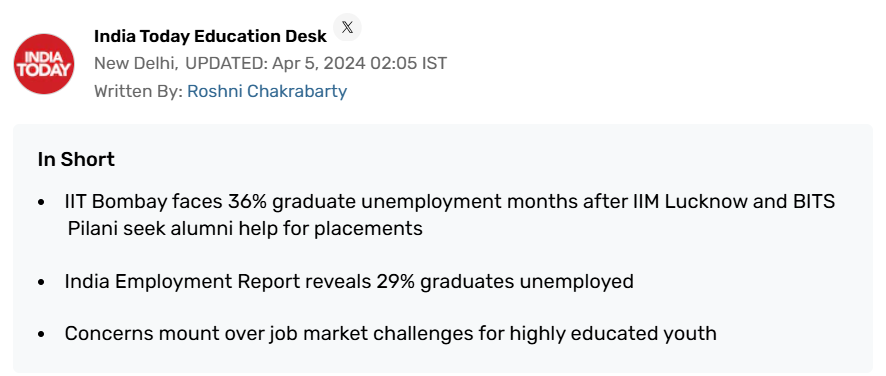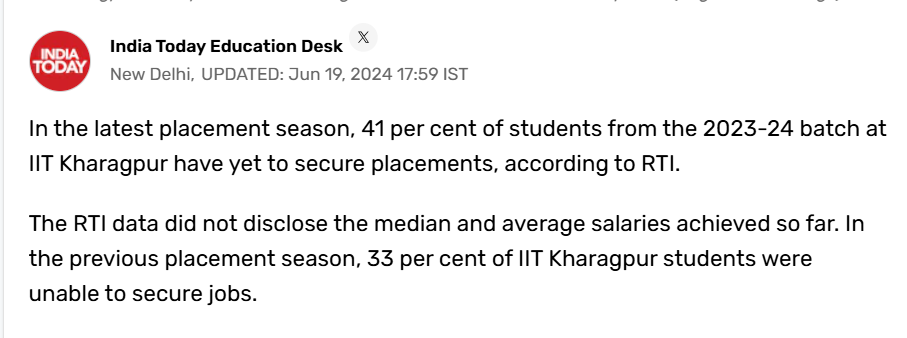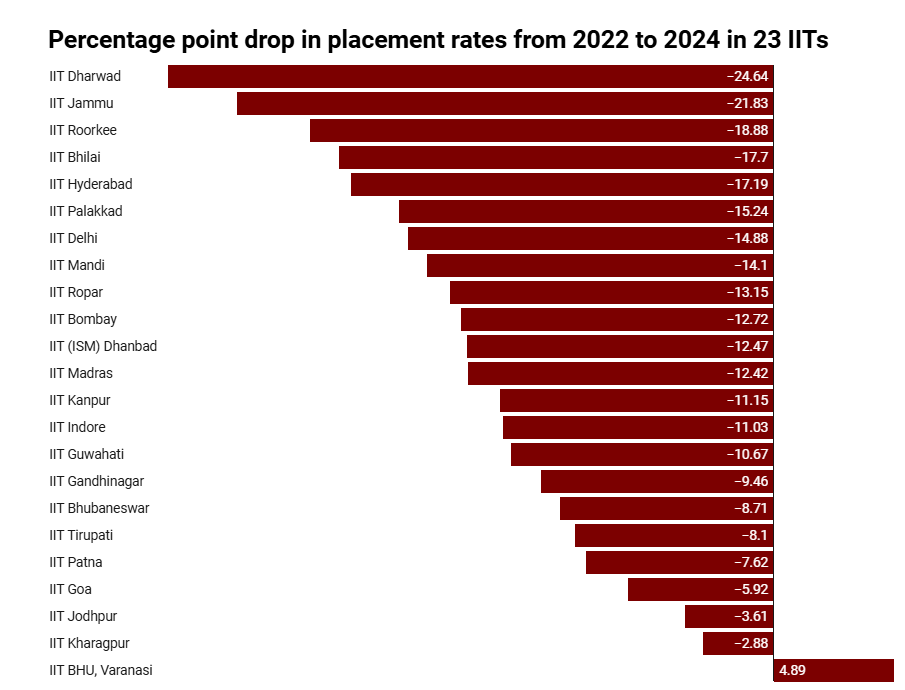#internships #career #jobs | Engineering Students | B.Tech – Building careers through real skills, not just degrees.
For years, the letters IIT and NIT have carried a sense of security. If you cleared the entrance exams and entered one of these campuses, a high-paying job at the end of your degree seemed certain. Families celebrated admission day as if it was the day a child’s career was secured.
But the reality of today is different. In recent placement seasons, some of the brightest minds from India’s top engineering colleges have walked out of campus without job offers. These are not isolated cases. Across IITs and NITs, the numbers reveal a growing crisis: the guarantee of a placement no longer exists.
This change leaves a serious question for students across the country. If even the top-ranked institutes cannot ensure jobs, what does it mean for everyone else? And more importantly, what can be done to fix this gap between education and employability?
The Harsh Reality of Placements
Recent placement seasons have been sobering.
At IIT Bombay, nearly 36% of the graduating batch in 2023–24 was still searching for jobs months after the placement process began. IIT Kharagpur reported that 41% of its students had not secured placements at the same stage. Across the IIT system, more than 8,000 graduates in a single year remained unplaced despite having cleared one of the toughest entrance exams in the world.


The numbers are not limited to one or two campuses. Data released by the Ministry of Education revealed that 22 out of 23 IITs have seen placement percentages fall between 2021 and 2024. NITs and IIITs, once seen as reliable sources of employable talent, have also reported downward trends.
For students, this is not just data. It is the lived experience of sitting in placement halls, watching friends secure offers while others wait endlessly. It is the stress of explaining to family why a degree from a top institute has not translated into a job.

Source: India Today
Why Even the Best Institutes Are Struggling
Placements are not failing because students are less capable. They are failing because the ecosystem has changed faster than academic institutions can adapt.
- Industry slowdown
Large IT service firms, which traditionally absorbed a large number of fresh graduates, have reduced fresher hiring. Economic uncertainty has made companies cautious, creating fewer opportunities for entry-level roles.
- Skills mismatch
Curriculum at many institutes is still heavily focused on theory. While students master fundamentals, the market demands applied expertise in fields like cloud computing, data engineering, artificial intelligence and cybersecurity. Employers want candidates who can deliver from day one, not just answer exam questions.
- Lack of portfolio evidence
A resume listing courses or projects is no longer enough. Recruiters look for proof-of-work—GitHub repositories, deployed applications, or case studies that demonstrate real problem-solving ability. Many graduates simply cannot show this level of evidence.
- Late and limited internships
Internships are often introduced in the final year, leaving little time for students to build experience and confidence. By the time students complete them, placement season is already underway.
- Soft skills gap
Many students who are technically sound still fail interviews. Why? Because they cannot explain their ideas clearly, work effectively in teams, or handle situational questions with confidence. Communication, collaboration, and adaptability are becoming as important as technical knowledge.
What Employers Actually Want
Employers are not rejecting graduates because they doubt their intelligence. They are rejecting them because they need more than theoretical ability.
When companies hire fresh graduates, they expect:
- Job-ready skills – aligned with current tools and technologies.
- Evidence of execution – projects that show the candidate can apply knowledge to real-world problems.
- Collaboration and communication – the ability to work in teams and interact with clients.
- Adaptability – since technologies and business needs evolve quickly.
In interviews, hiring managers increasingly prefer candidates who can point to specific work they have done, rather than those who only talk about subjects they have studied. This shift is why placement numbers are falling despite academic excellence.
How Pedestal EdTech Bridges the Gap
At Pedestal EdTech, we believe that every student deserves more than theory. They deserve training that makes them employable and internships that prove their capabilities. Our model is built around bridging the exact gaps that IITs, NITs and many universities are struggling with.
Live, Interactive Training
We run live sessions led by industry professionals. Students do not passively watch videos. They engage, ask questions and learn in real time—just like they would in a workplace environment.
Job-Oriented Pathways
We design programs around actual job roles:
- Full Stack and MERN Stack Development
- Data Science and Machine Learning
- Artificial Intelligence
- Cybersecurity
- Digital Marketing
Every pathway is based on current hiring trends and job descriptions from companies.
Internships With Real Impact
Our internships are not about observing. Students work on real projects, solving challenges similar to those faced by companies. By the end, they have deployable apps, dashboards or case studies that employers can review.
Portfolio Building
Every participant leaves with a portfolio that includes GitHub repositories, reports and project demonstrations. This proof-of-work sets them apart from peers who only have grades to show.
Placement Preparation
We integrate mock interviews, resume optimization and LinkedIn profile building into our programs. This ensures students are not only technically capable but also interview-ready.
Network and Industry Access
Pedestal connects students to mentors, alumni, and hiring partners. This network often becomes the difference between waiting for a placement call and receiving one.
Our MoUs With NITs and Universities:
Pedestal’s model is not just theory. We have already signed MoUs with NITs and top universities, integrating our training and internship programs into academic pipelines.
This means:
- Students get officially recognized opportunities.
- Institutes strengthen their placement support through our ecosystem.
- Companies access a better-prepared talent pool.
These collaborations prove that our approach is not only practical but also scalable—benefiting both individual students and institutions.
Why This Model Works Better Than Traditional Placement Prep
Traditional placement preparation revolves around aptitude tests and DSA practice. While useful, this approach is no longer enough. Companies need candidates who can perform from day one.
Pedestal’s model is different because it is role-first. Students are trained for the exact skills that hiring managers demand today. By the end of their internship, they do not just claim competence—they can demonstrate it.
This benefits everyone:
- Students gain confidence and employability.
- Institutes improve placement rates by partnering with Pedestal.
- Recruiters save time and effort by hiring candidates who are already industry-ready.
The Future of Employability
The employment landscape is shifting. Degrees alone are no longer enough. Employers want skill, proof and adaptability. In the next five years, the hiring process will increasingly prioritize portfolios and real-world exposure over marksheets.
For students, this is both a challenge and an opportunity. The challenge is that they must go beyond classroom learning. The opportunity is that with the right training and internships, they can stand out regardless of the college they attend.
Pedestal EdTech is built for this new future. By combining training, internships, and placement preparation, we ensure that students do not just study—they succeed.
Conclusion:
The recent struggles of IITs and NITs prove one thing: no institute, however prestigious, can guarantee placements anymore. The responsibility now lies with students to build skills that translate into jobs, and with institutes to provide them the right exposure.
Pedestal EdTech is ready to partner in this journey.
- If you are a student, do not wait until final year to think about placements. Start building your portfolio and industry experience now through our training and internships.
- If you represent an institute, collaborate with us to strengthen your placement pipeline and prepare students for the market as it exists today, not as it was ten years ago.
- If you are a recruiter, connect with us to access candidates who come with portfolios, hands-on experience and readiness to contribute from day one.
The gap between education and employment is real. But it does not have to decide your future. With the right support, every student can move from classroom to career with confidence.
At Pedestal EdTech, we are not just training students. We are building professionals who are truly industry-ready.


